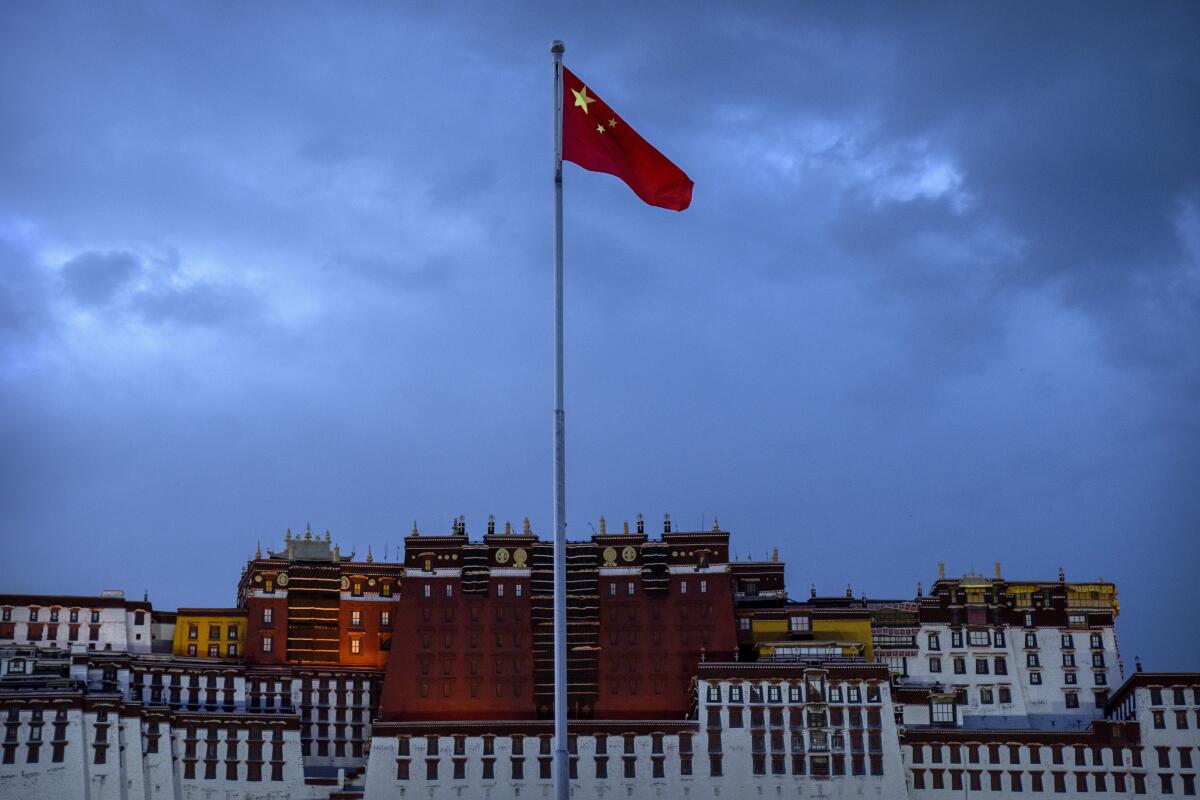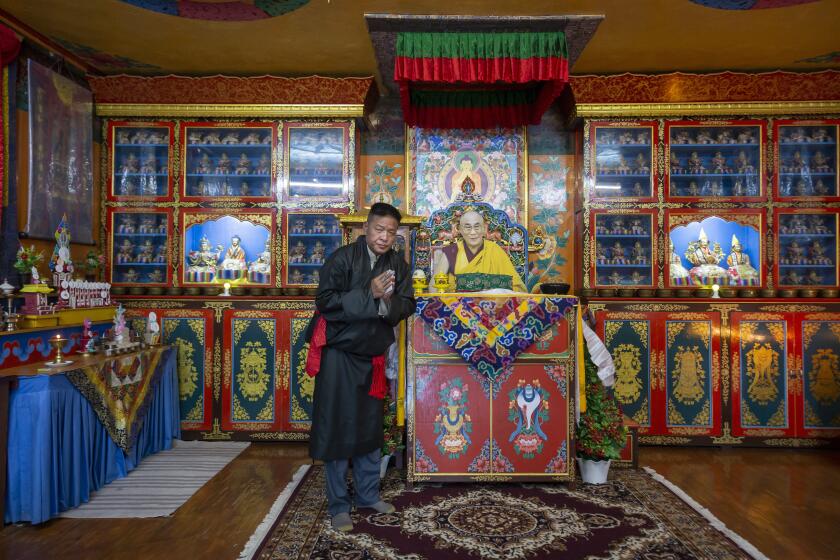China sanctions 2 U.S. citizens over action on Tibet

- Share via
BEIJING — China has sanctioned two U.S. citizens in retaliation for action taken by Washington over human rights abuses in Tibet, the government said Friday amid a continuing standoff over Beijing’s treatment of religious and ethnic minorities.
The Foreign Ministry said in a statement that Todd Stein and Miles Yu Maochun, as well as their close family members, would be banned from entering China.
Stein and Yu will also be barred from contact with people or organizations in China, and any of their assets there will be frozen.
The statement said the measures were in response to the U.S. sanctioning two Chinese citizens “under the excuse of the ‘Tibet human rights’ issue.”
Foreign Ministry spokesperson Mao Ning said that China was responding to what it considered a violation of the “basic norms of international relations” and that Stein and Yu “behaved egregiously on Tibet and other China-related issues.”
“We would like to stress once again that Tibetan affairs are purely an internal affair of China, and the U.S. has no right to interfere in it, and that gross interference in China’s internal affairs will be met with strong countermeasures from China,” Mao told reporters at a daily briefing.
The new president of the Tibetan government-in-exile says he is willing to reach out to the Chinese government to resolve their conflict.
“We urge the U.S. to withdraw the so-called sanctions and stop interfering in Tibetan affairs and China’s internal affairs,” the spokesperson said.
Neither Stein nor Yu could immediately be reached for comment.
On Dec. 9, the U.S. imposed sanctions on Wu Yingjie, the former top official in Tibet, and Zhang Hongbo, the region’s police chief, in what Secretary of State Antony J. Blinken said was an effort “to disrupt and deter the ... arbitrary detention and physical abuse of members of religious minority groups” in the region.
The Treasury Department said in a notice that Wu had been responsible for “stability policies” in Tibet that involved “serious human rights abuse, including extrajudicial killings, physical abuse, arbitrary arrests, and mass detentions.”
The notice accused police during Zhang’s tenure of “torture, physical abuse, and killings of prisoners, which included those arrested on religious and political grounds.”
China’s announcement gave no specific accusations against Stein and Yu.
Stein has been deputy staff director at the Congressional-Executive Commission on China since 2021 and was previously a senior advisor and lead staffer on Tibetan issues for Sarah Sewall, the State Department official overseeing civilian security, democracy and human rights. He is also former director of government relations at the monitoring group International Campaign for Tibet.
The Chinese-born Yu, an academic who has taught at the U.S. Naval Academy, is a noted critic of Chinese leader Xi Jinping‘s government. He also served as a key China advisor under former Secretary of State Michael R. Pompeo.
After his show of support for Tibet earlier this month, the ‘John Wick’ and ‘Matrix’ star has fallen afoul of the country’s strict censorship regime.
China has passed legislation in recent years mandating sanctions against individuals from the U.S., the European Union and elsewhere over perceived slights against its national interests.
Washington and other governments have compiled long lists of Chinese officials barred from visiting their countries or using their financial institutions. Those barred include the pro-Beijing leader of Hong Kong and municipal officials accused of abuses.
China asserts that Tibet has been part of its territory for centuries. Supporters of exiled Buddhist leader the Dalai Lama and most of the international community say it was functionally independent for most of that time.
China has ruled the Himalayan region since Communist forces invaded in 1950, and has imposed ever stricter surveillance and travel restrictions since the last uprising against Beijing’s rule in 2008. Lengthy prison sentences in dire conditions are imposed for acts perceived as defiance, such as defending the region’s language and Buddhist culture from assimilation.
China has also detained hundreds of thousands of Uyghurs and other Muslim minorities in reeducation camps, which human rights investigators describe as part of a campaign to wipe out their culture and language.
China denies such charges, claiming it is fighting terrorism, separatism and religious extremism.
More to Read
Sign up for Essential California
The most important California stories and recommendations in your inbox every morning.
You may occasionally receive promotional content from the Los Angeles Times.















